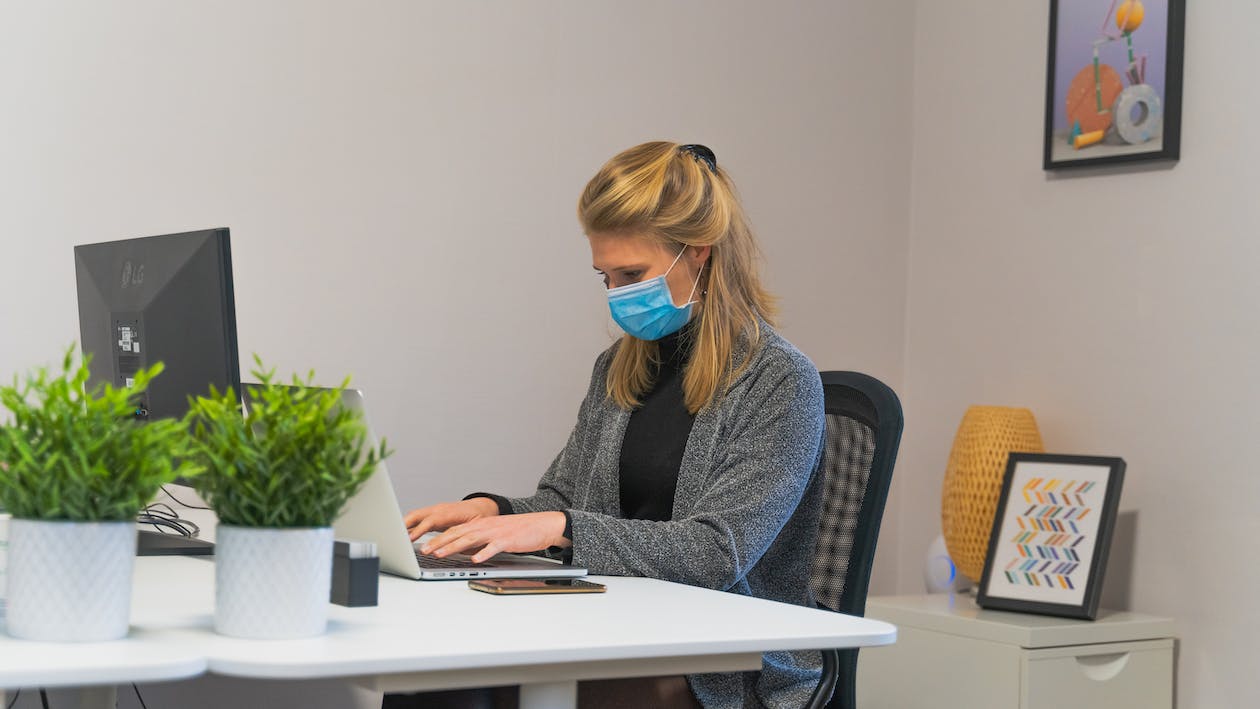The spread of COVID-19 has caused profound changes in our work and existence, compelling many businesses to embrace remote work methodologies, reimagine their office environments, and prioritize employee well-being. What lies ahead for the post-pandemic workplace? Will the allure of private offices fade, or will it intensify? How will the contours of workspace trends metamorphose in the days to come? In this blog, I will discuss possible post-pandemic scenarios and their implications for private offices. I will also impart insights culled from my own experiences as a premier purveyor of adaptable workplace solutions that expedite corporate pivots and scalability.
The Significance of Private Offices
Private offices are enclosed spaces that offer privacy, security, and comfort for individual workers or small teams. Desks, chairs, storage modules, and other amenities that support productivity and well-being are commonly installed in these areas. Their merits encompass:
1. Improving Concentration and Creativity: Private offices allow undivided attention to tasks, free of cacophonous interruptions or visual stimuli. Furthermore, they instill a sense of autonomy and dominion, which fosters ingenuity and novelty.
2. Facilitating Discourse and Collaboration: These private spaces allow for confidential conversations, the exchange of sensitive intelligence, and constructive feedback without fear of inadvertent eavesdropping or surveillance. They also encourage more personalized and intimate interactions, which have the potential to foster team members’ trust and camaraderie.
3. Boosting Morale and Motivation: Private offices can convey prestige, recognition, and gratitude to high-performing employees or those with specialized skills. They can also increase contentment and engagement in people who prefer a quiet and private work environment.
Explore additional features provided by private offices
Exploring the Evolution of Private Offices
The pandemic has cast doubt on previously held assumptions and preferences regarding private offices. A subset of workers has experienced the benefits of remote labor, including reduced commuting time and expenses, increased flexibility and control over their schedules, and improved work-life balance. A counter-narrative has emerged, with some grappling with the perils of remote work—solitude, stress, distraction, insufficient infrastructure or equipment, and the challenge of erecting barriers between their professional and personal spheres.
A survey conducted by McKinsey corroborates this ambivalence. Eighty percent of respondents expressed contentment with remote work, but only 41 percent attested to heightened productivity, while 28 percent found themselves as productive as they once were. Significantly, 52 percent lamented the absence of personal, in-person interactions with colleagues.
These findings imply that there is no universal panacea for the future of labor. It appears more likely that workers will aspire to a hybrid paradigm—a synthesis of remote work’s flexibility, independence, and convenience, coupled with the collaborative, social, and supportive attributes of the physical office. Private offices are unlikely to become obsolete in this context but will morph to meet the changing needs and expectations of the workforce. Predicted trends for private offices in the post-pandemic era include:
1. Increased Demand for Flexible and Tailored Environments: Professionals will seek a plethora of options and control over their workspace in terms of location, timing, and configuration to accommodate a variety of work modes—concentration, collaboration, learning, or relaxation. The adaptability to fine-tune personal preferences, including lighting, temperature, and furnishings, will be pivotal.
2. Increased Focus on Health and Well-Being: Employees will be more concerned about their physical and psychological well-being while at work. Expectations will pivot towards pristine, sanitized, well-ventilated spaces. Natural light, verdant surroundings, fresh air, and vistas will increase in popularity. Provision of seclusion, security, and emotional comfort will ascend in importance.
3. Augmented Integration of Technology and Innovation: Technological support will become increasingly integral to labor processes, enriching the work experience. Video conferencing, cloud computing, artificial intelligence, and virtual reality will become increasingly important. Environments equipped with smart devices, sensors, or biometrics, optimizing performance, efficiency, and convenience, will be coveted.
The Reawakening of Private Offices
Private offices are individual or small-group workspaces that are separate from other offices or common areas. They offer a dedicated and secure space for workers who need privacy, concentration, or collaboration. They also provide access to amenities such as high-speed internet, printing facilities, meeting rooms, coffee machines, etc.
Though not a nascent innovation, private offices for rent are experiencing a resurgence in the post-pandemic milieu, for several reasons. Primarily, they counterbalance the limitations of open-plan offices, criticized for their noisy environment, interruptions, and stress-inducing. Studies evince that open-plan offices may curtail productivity, amplify stress levels, impede memory retention, and contribute to the spread of pathogens. Private offices, on the other hand, provide a calm, serene, and sanitary environment conducive to performance and well-being.
Furthermore, private offices address the dilemmas inherent in remote labor by providing a professional, comfortable workspace close to but distinct from home. They extend the benefits of both remote and office-based labor without requiring compromise, allowing for a clear separation of work and personal life.
Hybrid Work Models
One of the key trends in the post-pandemic world is the adoption of hybrid work models that combine remote and in-office work. According to a PwC survey, 83% of employers reported success in their transition to remote work, but only 13% were willing to give up office space entirely. In contrast, 72% of employees expressed a desire for remote work, albeit on at least two days per week, with only 8% opting for full-time remote work.
In this light, hybrid work models present a flexible and adaptable solution that is sensitive to the various preferences and needs of both employees and employers. These models give workers the freedom to choose when and where they perform their duties based on the nature of their assignments, their schedules, and their personal circumstances. At the same time, they enable employers to optimize office space utilization, cut costs, and attract and retain talent.
Private offices fit in seamlessly with this new labor paradigm, giving workers the freedom to work with an office only when necessary, without long-term leases or commitments. Simultaneously, they provide employers with the capacity to supply their workforce with a secure, expedient, and productive workspace, without the necessity of investment in an expansive or enduring infrastructure.
Flexibility and Scalability
Another salient trajectory in the post-pandemic landscape revolves around the imperatives of flexibility and scalability in office solutions. Enterprises grapple with volatility and uncertainty in contemporary market dynamics, necessitating the nimble adaptation to evolving circumstances. Moreover, they must have the capacity to expand or contract office space prerequisites in consonance with their growth or contraction.
Private offices proffer both flexibility and scalability for organizations, irrespective of size. They confer the flexibility to lease office space on a provisional or permanent basis, commensurate with operational exigencies. Moreover, they furnish enterprises the prerogative to tailor the dimensions, location, and configuration of their office space, contingent upon fiscal constraints, preferences, and strategic objectives.
At WorkSocial, an array of private office options is at your disposal, catering to an extensive gamut of business requisites. Whether it is a solo workspace, a team enclave, or a bespoke office solution, our offerings are comprehensive. You can also select from a profusion of locations throughout the city, allowing for optimal convenience. Furthermore, our extensive network encompasses coworking hubs, meeting chambers, event venues, and virtual offices, serving a panoply of demands.
Our pricing schemes are exceptionally accommodating, featuring options for hourly, daily, weekly, monthly, or annual payments, attuned to your utilization patterns. Additionally, the flexibility to amend or rescind reservations sans encumbrances or penalties is extended. We further extend inducements, such as discounts and rewards for referrals, loyalty, and bulk bookings.
Check our flexible plans
Prioritizing Wellness-Centric Design
Within the post-pandemic milieu, wellness emerged as a pivotal criterion for choosing an office environment. Workers seek office spaces that espouse their physical, mental, and emotional well-being. Simultaneously, employers aspire to provision office spaces that augment employee contentment, engagement, and performance.
Office design occupies a central role in the cultivation of wellness. Design elements wield influence over worker mood, energy levels, and productivity, through variables such as illumination, color schemes, temperature control, ambient noise levels, ergonomic considerations, and aesthetic sensibilities.
At WorkSocial, a meticulous approach to office design underpins our commitment to wellness. Our private offices incorporate wellness-centric features and design principles, encompassing:
Natural light: Large windows that let in natural light, which can improve mood, alertness, and circadian rhythms.
Greenery: Our private offices have plants that add color, life, and freshness to the space. Plants can also purify the air, reduce stress, and boost creativity.
Artwork: Artwork that adds personality, style, and inspiration to the space. Artwork can also stimulate the senses, spark conversations, and foster culture.
Ergonomics: We offer ergonomic furniture and equipment that support the posture, comfort, and health of workers. Ergonomics can also prevent injuries, pain, and fatigue.
Aesthetics: Our private offices have a modern, minimalist, and elegant design that creates a professional, sophisticated, and inviting atmosphere. Aesthetics can also reflect the brand identity, values, and vision of the business.
In Conclusion
The COVID-19 pandemic has indelibly altered the landscape of work. Remote work has become a fixture, yet it does not serve as the exclusive or definitive choice for all. Many workers continue to yearn for social interaction, the trappings of a professional environment, and access to resources typically proffered by an office space. Simultaneously, they desire a greater degree of flexibility, privacy, and safety than what conventional office settings can provide.
Private offices emerge as the paragon solution for the post-pandemic era. They offer an equilibrium between remote and on-site work, adeptly addressing the preferences and requisites of contemporary workers. Moreover, they deliver an array of benefits, spanning heightened productivity, safety assurances, wellness enhancements, and work flexibility.
At WorkSocial, we are dedicated to delivering top-tier private office solutions, meticulously tailored to enhance your work experience. Our diverse array of private office configurations accommodates the spectrum of business necessities. Furthermore, our flexible pricing structures cater to budgets of all sizes. We go above and beyond by implementing stringent safety protocols, wellness features, cutting-edge technology solutions, and robust technical support to ensure that you have a secure, healthy, convenient, and productive work environment.
If you seek a workspace solution that will empower you to thrive in the post-pandemic epoch, look no further than our private offices.
Schedule a tour now



